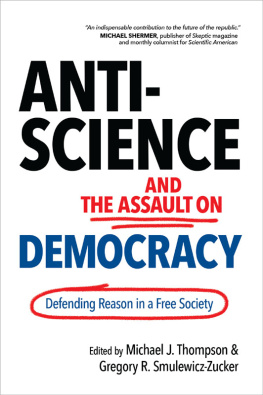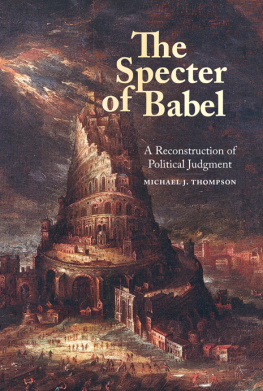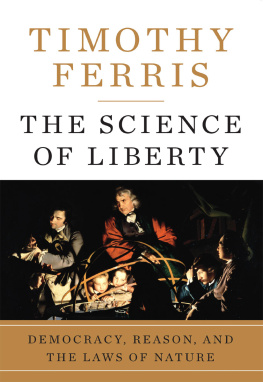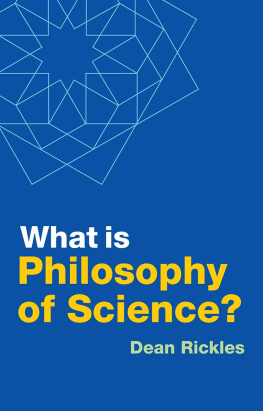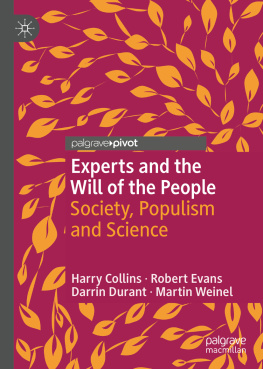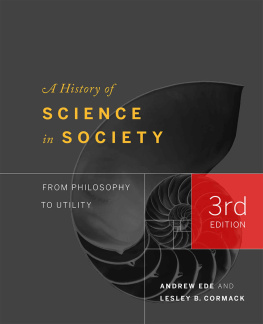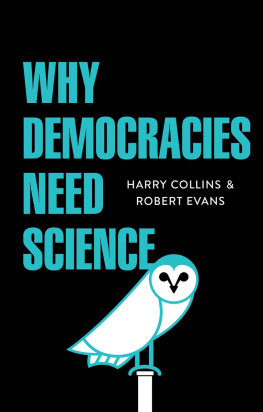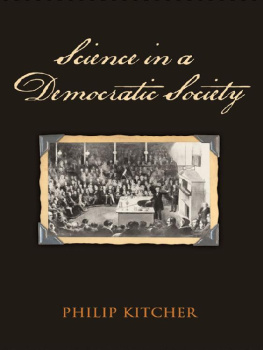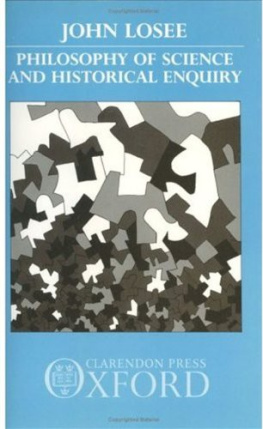
I propose to share with you a few reflections about the nature of scientific inquiry and its importance for public life. At a superficial level one could say that I will be addressing some aspects of the relation between science and society; but, as I hope will become clear, my aim is to discuss the importance, not so much of science, but of what one might call the scientific worldviewa concept that goes far beyond the specific disciplines that we usually think of as sciencein humanity's collective decision-making. I want to argue that clear thinking, combined with a respect for evidenceespecially inconvenient and unwanted evidence, evidence that challenges our preconceptionsare of the utmost importance to the survival of the human race in the twenty-first century, and especially so in any polity that professes to be a democracy.
Of course, you might think that calling for clear thinking and a respect for evidence is a bit like advocating Motherhood and Apple Pie (if you'll pardon me this Americanism)and in a sense you'd be right. Hardly anyone will openly defend muddled thinking or disrespect for evidence. Rather, what people do is to surround these confused practices with a fog of verbiage designed to conceal from their listenersand in most cases, I would imagine, from themselves as wellthe true implications of their way of thinking. George Orwell got it right when he observed that the main advantage of speaking and writing clearly is that when you make a stupid remark its stupidity will be obvious, even to yourself.to illustrate disrespect for evidence with a variety of examplescoming from the Left and the Right and the Centerstarting from some fairly lightweight targets and proceeding to heavier ones. I aim to show that the implications of taking seriously an evidence-based worldview are rather more radical than many people realize.
So let me start by drawing some important distinctions. The word science, as commonly used, has at least four distinct meanings: it denotes an intellectual endeavor aimed at a rational understanding of the natural and social world; it denotes a corpus of currently accepted substantive knowledge; it denotes the community of scientists, with its mores and its social and economic structure; and, finally, it denotes applied science and technology. In this essay I will be concentrating on the first two aspects, with some secondary references to the sociology of the scientific community; I will not address technology at all. Thus, by science I mean, first of all, a worldview giving primacy to reason and observation and, second, a methodology aimed at acquiring accurate knowledge of the natural and social world. This methodology is characterized, above all else, by the critical spirit: namely, the commitment to the incessant testing of assertions through observations and/or experimentsthe more stringent the tests, the betterand to revising or discarding those theories that fail the test. One corollary of the critical spirit is fallibilism: namely, the understanding that all our empirical knowledge is tentative, incomplete, and open to revision in the light of new evidence or cogent new arguments (though, of course, the most well-established aspects of scientific knowledge are unlikely to be discarded entirely).
It is important to note that well-tested theories in the mature sciences are supported in general by a powerful web of interlocking evidence coming from a variety of sources. Moreover, the progress of science tends to link these theories into a unified framework, so that (for instance) biology has to be compatible with chemistry, and chemistry with physics. The philosopher Susan Haack has illuminatingly analogized science to the problem of completing a crossword puzzle, in which any modification of one word will entail changes in interlocking words; in most cases the required changes will be fairly local, but in some cases it may be necessary to rework large parts of the puzzle.
I stress that my use of the term science is not limited to the natural sciences, but includes investigations aimed at acquiring accurate knowledge of factual matters relating to any aspect of the world by using rational empirical methods analogous to those employed in the natural sciences. (Please note the limitation to questions of fact. I intentionally exclude from my purview questions of ethics, aesthetics, ultimate purpose, and so forth.) Thus, science (as I use the term (Of course, the fact that we all practice science from time to time does not mean that we all practice it equally well, or that we practice it equally well in all areas of our lives.)
The extraordinary successes of the natural sciences over the last four hundred years in learning about the world, from quarks to quasars and everything in between, are well known to every modern citizen: science is a fallible yet enormously successful method for obtaining objective (albeit approximate and incomplete) knowledge of the natural (and to a lesser extent, the social) world.
But, surprisingly, not everyone accepts this; and here I come to my firstand most lightweightexample of adversaries of the scientific worldview, namely academic postmodernists and extreme social constructivists. Such people insist that so-called scientific knowledge does not in fact constitute objective knowledge of a reality external to ourselves, but is a mere social construction, on a par with myths and religions, which therefore have an equal claim to validity. If such a view seems so implausible that you wonder whether I am somehow exaggerating, consider the following assertions by prominent sociologists:
The validity of theoretical propositions in the sciences is in no way affected by factual evidence. (Kenneth Gergen)
The natural world has a small or non-existent role in the construction of scientific knowledge. (Harry Collins)
For the relativist [such as ourselves] there is no sense attached to the idea that some standards or beliefs are really rational as distinct
Since the settlement of a controversy is the cause of Nature's representation not the consequence, we can never use the outcomeNatureto explain how and why a controversy has been settled. (Bruno Latour)
Science legitimates itself by linking its discoveries with power, a connection which determines (not merely influences) what counts as reliable knowledge. (Stanley Aronowitz)
Statements as clear-cut as these are, however, rare in the academic postmodernist literature. More often one finds assertions that are ambiguous but can nevertheless be interpreted (and quite often are interpreted) as implying what the foregoing quotations make explicit: that science as I have defined it is an illusion, and that the purported objective knowledge provided by science is largely or entirely a social construction. For example, Katherine Hayles, professor of literature at Duke University and former president of the Society for Literature and Science, writes the following as part of her feminist analysis of fluid mechanics:
Despite their names, conservation laws are not inevitable facts of nature but constructions that foreground some experiences and marginalize others. Almost without exception, conservation laws were formulated, developed, and experimentally tested by men. If conservation laws represent particular emphases and not inevitable facts, then people living in different kinds of bodies and identifying with different gender constructions might well have arrived at different models for [fluid] flow.
(What an interesting idea: perhaps people living in different kinds of bodies will learn to see beyond those masculinist laws of conservation of energy and momentum.) And Andrew Pickering, a prominent sociologist of science, asserts the following in his otherwise-excellent history of modern elementary-particle physics:
Next page
